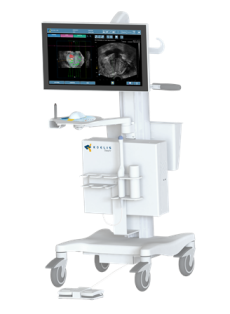Magnetic Resonance Imaging (MRI) technology is advancing in
new and exciting ways. An MRI machine uses magnetic and radio waves to produce diagnostic
images of soft tissues and structures within the body. Among the structures
visualized is the prostate.
At Good Samaritan Hospital, Our prostate studies do not require
an endorectal coil (a probe covered with an inflatable balloon which is
inserted into the rectum). This makes the prostate MRI similar to a normal MRI.
The technology makes the procedure much simpler and more comfortable.
Because an MRI uses magnetic waves to image the inside of
your body, a prostate MRI is totally painless and non-invasive. Not only is a
prostate MRI as accurate as a biopsy at detecting prostate cancers, but it can
also tell how advanced the cancer is and if it has spread to other parts of the
body. A prostate MRI can also detect other prostate conditions, like infections
or benign prostatic hyperplasia (BPH). And it
is better than prostate biopsies at differentiating between clinically
significant and insignificant cancers.
Four Reasons to Choose a Prostate MRI
- May help you avoid a painful biopsy
- Non-invasive and pain-free
- Can tell how advanced cancer is and whether it has spread
- Can detect other prostate conditions
Fusion Guided Biopsy: A Smarter Way to Look for Prostate Cancer

Screen, Detect and Treat Prostate Cancer FASTER
Prostate Cancer is the second most common cancer in men. In fact, about 1 in 7 men will be diagnosed with this disease in their lifetime. However, if cases are detected early they are often low-risk and can be treated quickly. Bon Secours Urology is committed to catching prostate cancer in its earliest stage and to do so has recently acquired the KOELIS Trinity® Fusion-Guided MRI, the premier prostate cartography option in the market.
MRI/Ultrasound fusion guided biopsy combines a specialized magnetic resonance imaging (MRI) scan with an ultrasound image to help urologists precisely target the area of the prostate that needs to be biopsied. This approach allows our doctors to ensure they sample the exact site in the prostate where there is concern for cancer.
With the MRI fusion guided biopsy, urologists are able to see the specific area that needs to be sampled and guide the needle to the precise spot. Studies show that MRI fusion guided biopsies help to target the tumors that need treatment and reduce the number of repeat biopsies and allowing for earlier diagnosis and treatment.
Bon Secours Urology's Christopher Dixon, MD is one of the nation's leading experts on this machine and has some of the most extensive experience utilizing it to treat patients in the entire country.
The Procedure:
Our specially trained radiologists circle any areas of concern on the MRI images so that they can be directly targeted on the ultrasound at the time of biopsy. The procedure requires the same preparation as standard prostate biopsies. It is completed in one day and usually does not require a hospital stay.
Patient Benefits:
- This technique allows our specialists to find hidden tumors that may be missed by other prostate biopsies.
- We can perform targeted biopsies using sophisticated MRI/ultrasound fused images to focus on the worrisome areas directly.
- The technology, which has proven to be very useful for men with previous negative biopsies, may also help detect aggressive cancers in patients who have not had a previous biopsy.
- It may reduce the number of biopsies you need.